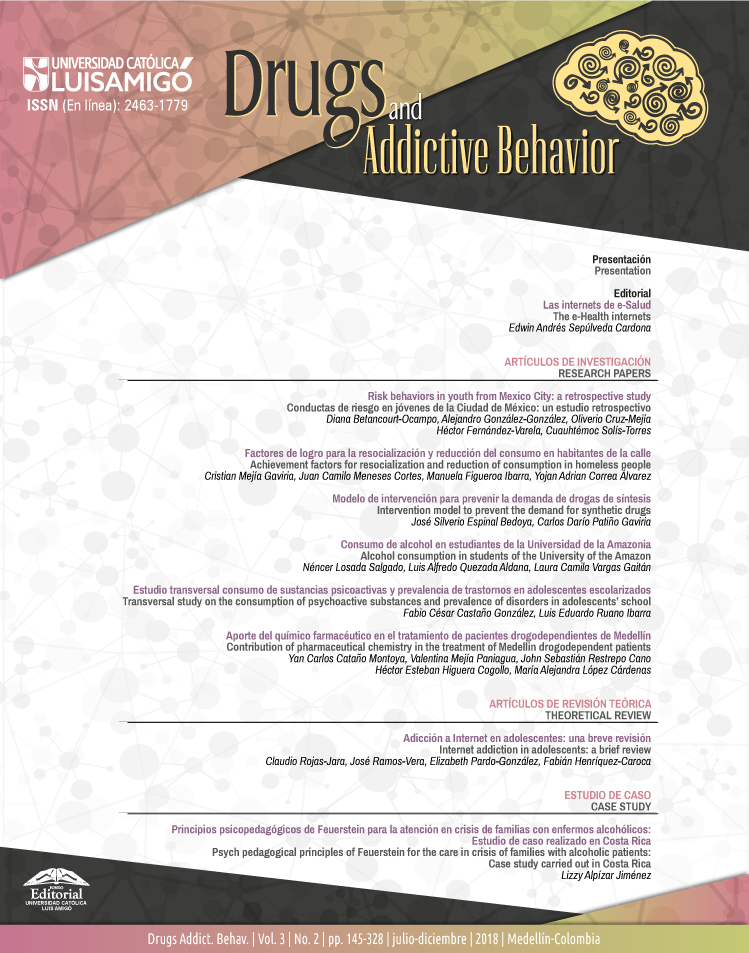Presentation
DOI:
https://doi.org/10.21501/24631779.2865Keywords:
Addictions, Psychology, PreventionAbstract
The magazine Drugs and Addictive Behavior, responsible for the diffusion of scientific texts, has placed its interest in the publication of articles on the consumption of psychoactive substances and behavioral addictions, as well as in the areas of intervention, especially prevention.
The current number, corresponding to the period july-december 2018, presents six research articles, a case study and a theoretical review text, to which is added an editorial focused on “e-Health internets” as new forms of intervention mediated by the use of technologies.
Downloads
References
Alpízar Jiménez, L., (julio-diciembre, 2018). Principios psicopedagógicos de Feuerstein para la atención en crisis de familias con enfermos alcohólicos: estudio de caso realizado en Costa Rica. Drugs and Addictive Behavior, 3(2), 283-301 DOI: http://dx.doi.org/10.21501/24631779.2875
Betancourt-Ocampo, D., González-González, A., Cruz-Mejía, O., Fernández-Varela, H., y Solís-Torres, C. (julio- diciembre, 2018). Risk behaviors in youth from Mexico City: a retrospective study. Drugs and Addictive Behavior, 3(2), 167-181. DOI: http://dx.doi.org/10.21501/24631779.2882
Cataño Montoya, Y. C., Mejía Paniagua, V., Restrepo Cano, J. S., Higuera Cogollo, H. E., y López Cárdenas, M. A. (julio-diciembre, 2018). Aporte del químico farmacéutico en el tratamiento de pacientes drogodependientes de Medellín. Drugs and Addictive Behavior, 3(2), 256-265. DOI: http://dx.doi.org/10.21501/24631779.2871
Castaño González, F. C., y Ruano Ibarra, L. E. (julio-diciembre, 2018). Estudio transversal sobre consumo de Sustancias Psicoactivas y prevalencia de trastornos en adolescentes escolarizados. Drugs and Addictive Behavior, 3(2), 233-255. DOI: http://dx.doi.org/10.21501/24631779.2870
Espinal Bedoya, J. S. y Patiño Gaviria, C. D. (julio-diciembre, 2018). Modelo de intervención para prevenir la demanda de drogas de síntesis. Drugs and Addictive Behavior, 3(2), 200-218. DOI: http://dx.doi.org/10.21501/24631779.2868
Losada Salgado, N., Quezada Aldana, L. A., y Vargas Gaitán, L. C. (julio-diciembre, 2018). Consumo de alcohol en estudiantes de la Universidad de la Amazonia. Drugs and Addictive Behavior, 3(2), 219-232. DOI: http://dx.doi.org/10.21501/24631779.2869
Mejía Gaviria, C., Meneses Cortes, J. C., Figueroa Ibarra, M. y Correa Álvarez, Y. A. (julio-diciembre, 2018). Factores de logro para la resocialización y reducción del consumo en habitantes de la calle. Drugs and Addictive Behavior, 3(2), 182-199. DOI: http://dx.doi.org/10.21501/24631779.2867
Rojas Jara, C., Ramos Vera, J., Pardo-González, E., y Henríquez-Caroca, F. (julio-diciembre, 2018). Adicción a internet en adolescentes: una breve revisión. Drugs and Addictive Behavior, 3(2), 267-281. DOI: http://dx.doi.org/10.21501/24631779.2876
Sepúlveda-Cardona, E. A. (2018). Las internets de e-Salud [Editorial]. Drugs and Addictive Behavior, 3(2), 156-160. DOI: http://dx.doi.org/10.21501/24631779.2866
Downloads
Published
How to Cite
Issue
Section
License
INTELLECTUAL PROPERTY
The authors are morally and legally responsible for the content of their articles, as well as respect for copyright. Therefore, these do not compromise in any way the Luis Amigó University Foundation.
The reproduction of the articles will be governed as described in http://creativecommons.org/
PUBLICATIONS POLICY
• The author must send the statement of assignment of economic rights and the declaration of conflicts of interest in favor of the journal. Said document will be provided by the Editor and indicates the originality of the article, which is not published and which is not simultaneously postulated in another medium.
• The address of the journal Drugs and Addictive Behavior will confirm to the author, in a maximum of three (3) days, the reception of the received contribution, if its sending is done through the electronic mail; or immediately, if it is entered through the OJS (Open Journal Systems). The reception of articles does not imply an obligation to publish them.
• The journal Drugs and Addictive Behavior will submit the articles received for initial evaluation by the Editorial Committee; In case the Committee finds the material relevant, it will be evaluated by anonymous arbitrators, who will determine if it is publishable.
• Once the evaluation of the article has begun, the authors agree not to remove it in any part of the process.
• Printed items will not be received. All the proponents will have to send their writings through the e-mail of the magazine or the OJS.
• Partial versions of the text will not be received, that is, those that the author considers to modify and that are not structurally adjusted to a type of article.
• Once the article is sent, it is understood that the author authorizes the publication of their contact information and institutional affiliation.
• The authors are directly responsible for the ideas, judgments and opinions expressed in the articles; in such a way that the content does not compromise the thinking of the Editorial Committee or the Institution.
ETHICS OF PUBLICATION
• The Editorial Committee, by virtue of transparency in the processes, will ensure the academic quality of the journal.
• Causes of rejection are considered: plagiarism and self-plagiarism, adulteration, invention or falsification of content and author data, and that the article is not original and unpublished.
• The editor will verify the relevance of the article, in accordance with the policies of the journal and supported by Turnitin's Originality Check, software that detects errors in the handling of appointments, possible copies and plagiarism. If it considers it viable, it will send the article to the arbitrators; otherwise it will report the findings to the author and discard it. The articles must have a minimum originality level of 75%.
• In no case, the journal's management will require the author to cite it or publish articles with conflicts of interest.
• If once the article is published: 1) the publisher discovers plagiarism, adulteration, invention or falsification of data of the content and the author or substantive errors that attempt against the quality or scientificity, may request its removal or correction. 2) A third party detects the error, it is the obligation of the author to retract immediately and proceed to the public removal or correction.
• The opinions contained in the articles are attributable exclusively to the authors; therefore, the Institution is not responsible for what they may generate.


